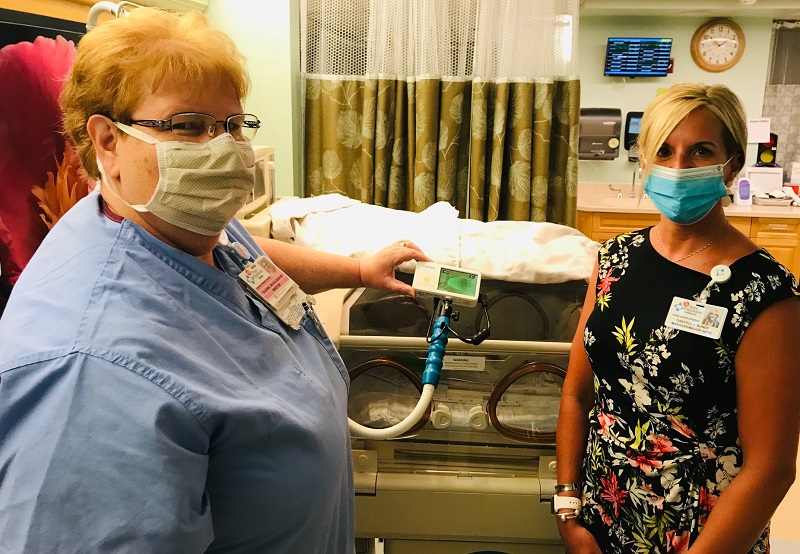
DuBois, PA – Imagine having a grandbaby, a new niece or nephew, or a younger sibling in the neonatal intensive care unit and not being to see them.
Although you can’t visit in person, Penn Highlands DuBois is making it easier to stay bonded with new babies in the neonatal intensive care unit with their NICVIEW equipment… webcams where parents, siblings, and extended family can watch the baby.
Listen to the full interview with director of the Penn Highlands DuBois NICU, Sue McCullough.
***
FAQ about the Penn Highlands DuBois NICU NICVIEW
At Penn Highlands Healthcare, your baby’s care is our top priority. The Neonatal Intensive Care Unit (NICU) at Penn Highlands DuBois is the only NICU in the region, with other nearest NICUs 100 miles away or more. That’s one reason we provide our newborn patients’ families with the opportunity to watch their babies from wherever they are.
At each baby’s bed space within our NICU, a NICVIEW web camera exists to provide a secure online portal for our patients’ parents, family and friends to check on their baby in real time, 24/7. No one else may view the baby unless the parents share those credentials with them.
NICVIEW can help you develop a bond when your baby is in the hospital while you are at home or work. Night or day, access is as close as your phone or computer.
How does the NICVIEW webcam work?
Penn Highlands’ NICU staff will print out unique encrypted credentials that will allow you to access a secure video stream of your baby. “Unique” and “secure” means no one else can view your baby unless you share those credentials with them.
To access the private streaming images of your baby, go to: www.nicview.net.
Enter your unique log-in username and password to connect. The first time you or a family member log in from a new computer, tablet, or smart phone, you may be asked to acknowledge a one-time consent.
What will I see?
You will be able to see your baby and even take snapshots. The camera does not transmit sound nor records video.
If the nurse or provider is caring for your baby, you may see a temporary “off-line” message. In this case, please check back in 15-30 minutes.
Remember that at Penn Highlands Healthcare, your baby’s care is our top priority. This means the child’s image may be off-line frequently. The care you see and experience when you’re in the NICU is the same care your baby receives when you are home. Newborns will move, cry and spit up; and these are all natural baby responses. Please be patient and know your child is receiving excellent care.
If you feel the camera lens needs to be repositioned, call the NICVIEW technical service number at the bottom of the viewing screen, as the camera lens can be repositioned remotely.
Please note that if your baby has a blanket over his or her incubator to protect them from bright light, your view may be darkened. If your baby is under Bili lights for phototherapy, the color may be somewhat distorted.

Sue McCullough displaying one of the NICVIEW webcams with Danyell Bundy, PHH Fund Development manager of major gifts.
***
Read the press release from Penn Highlands Healthcare, originally printed in the Tri-County Sunday edition of Courier Express.
Dubois, PA – Unless you’ve ever had a newborn who needed specialized support, you may not realize that the neonatal intensive care unit (NICU) at Penn Highlands DuBois is the only NICU within a 100-mile radius. Known as a level 3 NICU (whose designation means the unit can care for newborns who are acutely ill, premature, or who need advanced ventilator therapy), Penn Highlands transports neonatal patients in by ground and air from the Tri-County region and as far as Clarion County, Indiana, Armstrong County, and Potter County, including Bradford.
As such, Penn Highlands NICU director Suzanne McCullough, RN, explains that some families have an understandably tough time separating from their newborn when the baby has to stay. “We have a lot of families who have transportation issues,” McCullough says. “Getting here can be sporadic for them. It makes it difficult.”
That’s why in 2019, the Penn Highlands Healthcare Fund Development team saw an opportunity to help families stay connected through the power of technology. The Fund Development department had recently learned about a crib-side web camera system called NICVIEW, from the medical equipment and software company, Natus.
Natus states that the 24-hour NICVIEW video streaming service on demand can “reduce the distress and anxiety mothers can feel at being separated from a newborn.” Also, by observing their newborn’s routine in the NICU, parents may adapt their own routine to create a smooth transition to life at home when the infant is discharged from the hospital. “For first-time parents especially, to be away from the baby just wakes you up wondering and worrying: ‘Is my baby ok?’” McCullough explains. “If they can log on and see their baby, it potentially could give comfort to the parents.”
Turning to contacts at major foundations, Penn Highlands Fund Development, led by system director Karin Pfingstler, was able to secure funding for the NICVIEW web cameras through grants. The first, for $7,500, came from the Ronald McDonald House Charities of Mid-Penn Region, Inc., based in Hollidaysburg. Encouraged by this generosity, Fund Development was also aware of the NICU’s volume: an average of 300 babies admitted per year with the average patient staying eight to 10 days. Knowing this, Pfingstler and her team set out to pursue more support. “We knew that PNC in particular wants to support programs that deal with children from infancy to age five,” Pfingstler says. “We believed that with our NICU being one of the few in the area, this could be something they might be interested in.”
In turn, PNC came through with a $20,000 grant that, when combined with the donation from Ronald McDonald House, would facilitate the purchase of eight NICVIEW cameras. “When we approached Ronald McDonald House and PNC,” Pfingstler says, “this was an undeniable piece of technology that has such a well-rounded application. It was hard to refuse the project.”
After more than a year in progress, the NICVIEW cameras were installed last week. “What I learned from Sue when we first had this conversation is that when a patient is separated from their newborn infant, trying to resume some sense of normalcy is challenging,” Pfingstler says. “This device allows a new mother some sense of connectivity, even though she isn’t present.” McCullough adds that in the time of COVID-19 when visitation inside the NICU is limited to parents-only to protect the babies’ immune systems, the NICVIEW cameras enable parents, grandparents and other loved ones “to see [the baby’s] progress before they get home,” says McCullough, who will soon be a first-time grandmother herself. “That’s going to be so important.”
McCullough highlights an added benefit that the layperson might not think of. With a capacity to care for 16 tiny patients at a time, the Penn Highlands NICU staff has plenty on their plate. “I think the most helpful part for staff is that parents can actually see that their baby is well cared for and comfortable, and that we’re taking physical care of their baby,” McCullough says. “I’m hoping that for those reasons, it’s a win-win for parents.”
The Penn Highlands NICU staff will print unique encrypted login credentials that only one party, the child’s parent(s), will receive. NICVIEW is private and secure, so no one will gain access to view a baby unless the parent shares the credentials with them. Viewers have the opportunity to take a screenshot of the child, and eventually, explains McCullough, they hope to track the geographical location of all the loved ones who have logged in to view the baby. “In coming months, we’ll be able to print out a map of everywhere the loved ones live. Then we’ll post it so we can actually see the reach of how far some of these families are.”
Pfingstler says the Penn Highlands NICU is a particular area of interest for some independent donors. With donations, they hope to one day add features like a nutrition room for preparing and storing breast milk and formula, greater storage, and private spaces for education and consultation between parents and their healthcare providers.
To learn more about the Penn Highlands Neonatal Intensive Care Unit, please visit https://www.phhealthcare.org/NICU.








